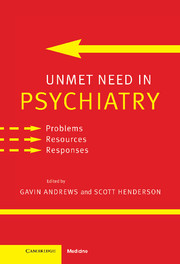Book contents
- Frontmatter
- Contents
- List of Contributors
- Preface
- Part I Unmet need: defining the problem
- Part II Unmet need: general problems and solutions
- Part III Unmet need: people with specific disorders
- Introduction
- 13 The unmet needs of people suffering from schizophrenia
- 14 The early course of schizophrenia: new concepts for early intervention
- 15 Unmet need in depression: varying perspectives on need
- 16 Unmet need following serious suicide attempt: follow-up of 302 individuals for 30 months
- 17 Met and unmet need for interventions in community cases with anxiety disorders
- 18 The unmet need for treatment in panic disorder and social phobia
- 19 Alcohol-use disorders: who should be treated and how?
- 20 Putting epidemiology and public health in needs assessment: drug dependence and beyond
- 21 Why are somatoform disorders so poorly recognized and treated?
- Part IV Unmet need: specific issues
- Part V Unmet need: conclusion
- Index
13 - The unmet needs of people suffering from schizophrenia
from Part III - Unmet need: people with specific disorders
Published online by Cambridge University Press: 21 August 2009
- Frontmatter
- Contents
- List of Contributors
- Preface
- Part I Unmet need: defining the problem
- Part II Unmet need: general problems and solutions
- Part III Unmet need: people with specific disorders
- Introduction
- 13 The unmet needs of people suffering from schizophrenia
- 14 The early course of schizophrenia: new concepts for early intervention
- 15 Unmet need in depression: varying perspectives on need
- 16 Unmet need following serious suicide attempt: follow-up of 302 individuals for 30 months
- 17 Met and unmet need for interventions in community cases with anxiety disorders
- 18 The unmet need for treatment in panic disorder and social phobia
- 19 Alcohol-use disorders: who should be treated and how?
- 20 Putting epidemiology and public health in needs assessment: drug dependence and beyond
- 21 Why are somatoform disorders so poorly recognized and treated?
- Part IV Unmet need: specific issues
- Part V Unmet need: conclusion
- Index
Summary
Increasing importance is being attached to the needs of those who suffer from schizophrenia. This new orientation marks a wider public mood that emphasizes the active role of the recipients of health services as consumers, and also raises a series of important consequent questions. How can needs be defined and by whom? How can they be measured and compared? What importance should be given to both met and unmet needs when assessing individual patients, and when planning and evaluating the mental health services as a whole? How should the needs of those suffering from schizophrenia be prioritized in relation to the needs of other diagnostic groups?
These questions form the context of this chapter. Here we examine in turn these two levels of need: individual and service. In the first section of the chapter, we shall describe three methods of assessing individual patient's needs (the Needs for Care Assessment, the Camberwell Assessment of Need, and the Cardinal Needs Schedule), and we shall give details of one study in South London which has used this approach to assess unmet individual needs. In the second section we turn to service-level (or population) needs, and describe four methods appropriate to this level. We then offer one example to highlight this method of needs assessment which draws upon a recent detailed review of the needs for mental health services throughout London. Finally we return to one of the most central and intriguing issues: who should define these needs?
Keywords
- Type
- Chapter
- Information
- Unmet Need in PsychiatryProblems, Resources, Responses, pp. 197 - 217Publisher: Cambridge University PressPrint publication year: 2000
- 2
- Cited by



